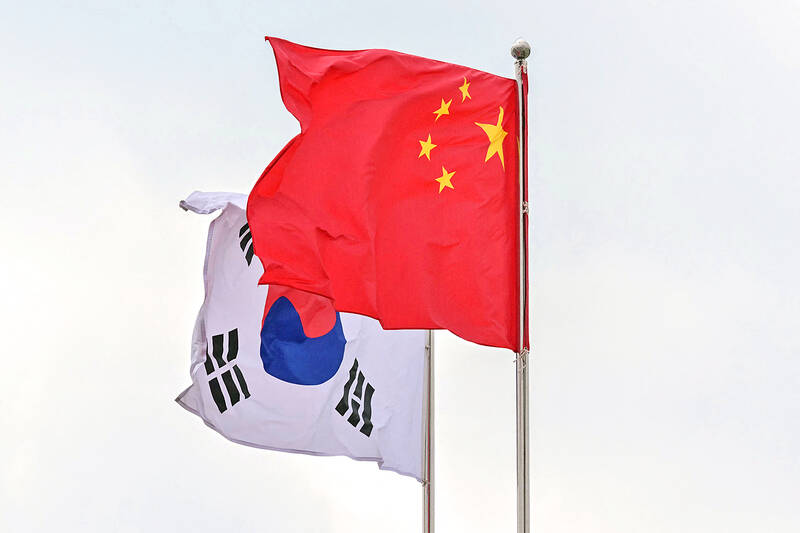China yesterday confirmed the detention of a South Korean citizen suspected of espionage, saying it had advised embassy officials, without identifying the individual or detailing the charges.
It is the first time a South Korean national is being held under an expanded counterespionage law that took effect in July last year.
The case could deter investment and operations by South Korean firms in the country’s largest trade partner, following the departure of Japanese expatriates after a compatriot working for Astellas Pharma Inc faced similar charges.

Photo: AFP
It centers on a former employee of Samsung Electronics Co who then worked at a Chinese chip firm, the Yonhap news agency reported.
“The South Korean citizen was arrested by the Chinese authorities in accordance with the law on suspicion of espionage,” Chinese Ministry of Foreign Affairs spokesman Lin Jian (林劍) told a regular news briefing in Beijing, without giving details.
The South Korean embassy in China had been notified, he added.
On Monday, Yonhap said the individual was suspected of leaking semiconductor-related information to South Korean authorities and was living in Hefei in China’s eastern province of Anhui when he was detained.
Major Chinese chip companies, such as ChangXin Memory Technologies Inc (長鑫存儲), are headquartered in the city.
Since Washington began banning export of cutting-edge foreign chips and chipmaking equipment to China in 2020, Beijing has invested billions of dollars in its domestic semiconductor industry to achieve a goal of self-sufficiency.
The tensions around the industry have made Beijing wary of information leaks, which it views as a national security threat.
The confirmation of the arrest also comes after tough measures by Seoul to prevent what it sees as the theft of semiconductor intellectual property by Chinese firms.
Choi Jin-seog, a former Samsung executive who ran a chipmaking venture in China, was detained by the Seoul Central District Court last month on fresh accusations regarding the theft of chip processing technology.
Choi had already been the subject of a high-profile industrial espionage trial since July last year that underscored South Korea’s efforts to fight industrial espionage and slow China’s progress in chipmaking. Choi has denied any wrongdoing.

‘SWASTICAR’: Tesla CEO Elon Musk’s close association with Donald Trump has prompted opponents to brand him a ‘Nazi’ and resulted in a dramatic drop in sales Demonstrators descended on Tesla Inc dealerships across the US, and in Europe and Canada on Saturday to protest company chief Elon Musk, who has amassed extraordinary power as a top adviser to US President Donald Trump. Waving signs with messages such as “Musk is stealing our money” and “Reclaim our country,” the protests largely took place peacefully following fiery episodes of vandalism on Tesla vehicles, dealerships and other facilities in recent weeks that US officials have denounced as terrorism. Hundreds rallied on Saturday outside the Tesla dealership in Manhattan. Some blasted Musk, the world’s richest man, while others demanded the shuttering of his

ADVERSARIES: The new list includes 11 entities in China and one in Taiwan, which is a local branch of Chinese cloud computing firm Inspur Group The US added dozens of entities to a trade blacklist on Tuesday, the US Department of Commerce said, in part to disrupt Beijing’s artificial intelligence (AI) and advanced computing capabilities. The action affects 80 entities from countries including China, the United Arab Emirates and Iran, with the commerce department citing their “activities contrary to US national security and foreign policy.” Those added to the “entity list” are restricted from obtaining US items and technologies without government authorization. “We will not allow adversaries to exploit American technology to bolster their own militaries and threaten American lives,” US Secretary of Commerce Howard Lutnick said. The entities

Minister of Finance Chuang Tsui-yun (莊翠雲) yesterday told lawmakers that she “would not speculate,” but a “response plan” has been prepared in case Taiwan is targeted by US President Donald Trump’s reciprocal tariffs, which are to be announced on Wednesday next week. The Trump administration, including US Secretary of the Treasury Scott Bessent, has said that much of the proposed reciprocal tariffs would focus on the 15 countries that have the highest trade surpluses with the US. Bessent has referred to those countries as the “dirty 15,” but has not named them. Last year, Taiwan’s US$73.9 billion trade surplus with the US

Prices of gasoline and diesel products at domestic gas stations are to fall NT$0.2 and NT$0.1 per liter respectively this week, even though international crude oil prices rose last week, CPC Corp, Taiwan (台灣中油) and Formosa Petrochemical Corp (台塑石化) said yesterday. International crude oil prices continued rising last week, as the US Energy Information Administration reported a larger-than-expected drop in US commercial crude oil inventories, CPC said in a statement. Based on the company’s floating oil price formula, the cost of crude oil rose 2.38 percent last week from a week earlier, it said. News that US President Donald Trump plans a “secondary